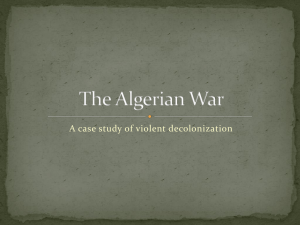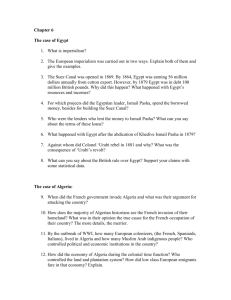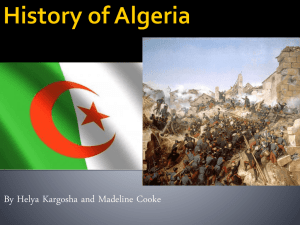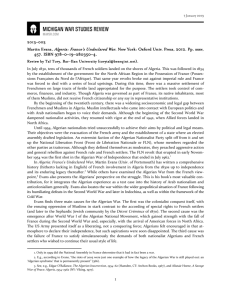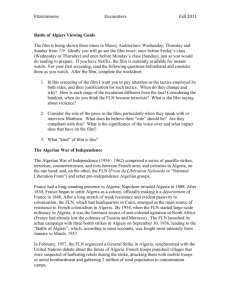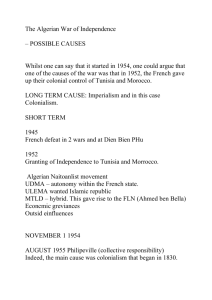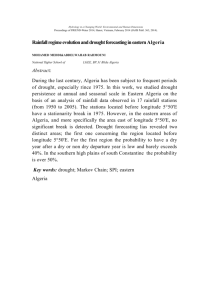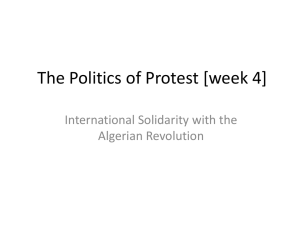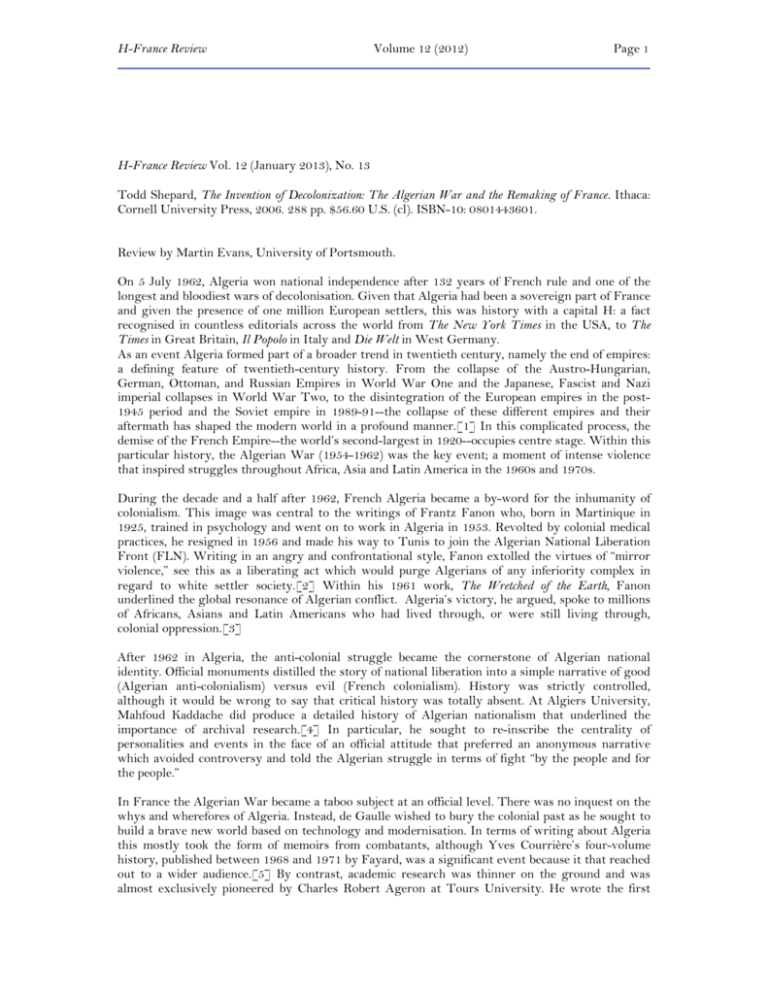
H-France Review
Volume 12 (2012)
Page 1
H-France Review Vol. 12 (January 2013), No. 13
Todd Shepard, The Invention of Decolonization: The Algerian War and the Remaking of France. Ithaca:
Cornell University Press, 2006. 288 pp. $56.60 U.S. (cl). ISBN-10: 0801443601.
Review by Martin Evans, University of Portsmouth.
On 5 July 1962, Algeria won national independence after 132 years of French rule and one of the
longest and bloodiest wars of decolonisation. Given that Algeria had been a sovereign part of France
and given the presence of one million European settlers, this was history with a capital H: a fact
recognised in countless editorials across the world from The New York Times in the USA, to The
Times in Great Britain, Il Popolo in Italy and Die Welt in West Germany.
As an event Algeria formed part of a broader trend in twentieth century, namely the end of empires:
a defining feature of twentieth-century history. From the collapse of the Austro-Hungarian,
German, Ottoman, and Russian Empires in World War One and the Japanese, Fascist and Nazi
imperial collapses in World War Two, to the disintegration of the European empires in the post1945 period and the Soviet empire in 1989-91--the collapse of these different empires and their
aftermath has shaped the modern world in a profound manner.[1] In this complicated process, the
demise of the French Empire--the world’s second-largest in 1920--occupies centre stage. Within this
particular history, the Algerian War (1954-1962) was the key event; a moment of intense violence
that inspired struggles throughout Africa, Asia and Latin America in the 1960s and 1970s.
During the decade and a half after 1962, French Algeria became a by-word for the inhumanity of
colonialism. This image was central to the writings of Frantz Fanon who, born in Martinique in
1925, trained in psychology and went on to work in Algeria in 1953. Revolted by colonial medical
practices, he resigned in 1956 and made his way to Tunis to join the Algerian National Liberation
Front (FLN). Writing in an angry and confrontational style, Fanon extolled the virtues of “mirror
violence,” see this as a liberating act which would purge Algerians of any inferiority complex in
regard to white settler society.[2] Within his 1961 work, The Wretched of the Earth, Fanon
underlined the global resonance of Algerian conflict. Algeria’s victory, he argued, spoke to millions
of Africans, Asians and Latin Americans who had lived through, or were still living through,
colonial oppression.[3]
After 1962 in Algeria, the anti-colonial struggle became the cornerstone of Algerian national
identity. Official monuments distilled the story of national liberation into a simple narrative of good
(Algerian anti-colonialism) versus evil (French colonialism). History was strictly controlled,
although it would be wrong to say that critical history was totally absent. At Algiers University,
Mahfoud Kaddache did produce a detailed history of Algerian nationalism that underlined the
importance of archival research.[4] In particular, he sought to re-inscribe the centrality of
personalities and events in the face of an official attitude that preferred an anonymous narrative
which avoided controversy and told the Algerian struggle in terms of fight “by the people and for
the people.”
In France the Algerian War became a taboo subject at an official level. There was no inquest on the
whys and wherefores of Algeria. Instead, de Gaulle wished to bury the colonial past as he sought to
build a brave new world based on technology and modernisation. In terms of writing about Algeria
this mostly took the form of memoirs from combatants, although Yves Courrière’s four-volume
history, published between 1968 and 1971 by Fayard, was a significant event because it that reached
out to a wider audience.[5] By contrast, academic research was thinner on the ground and was
almost exclusively pioneered by Charles Robert Ageron at Tours University. He wrote the first
H-France Review
Volume 12 (2012)
Page 2
scholarly studies and also supervised the first doctoral students, including Benjamin Stora who
began pioneering research on Algerian nationalism.
The 1980s and 1990s were the two decades when Algeria emerged as historical object of study. In
this respect, the work of Mohammed Harbi and Benjamin Stora were central. Harbi was a former
FLN combatant who had been imprisoned in post-independence Algeria. Escaping to Paris in 1973,
he became a history lecturer at the University of Paris. Drawing upon his personal archives, his
unique position as an insider within the wartime FLN, and notes written during imprisonment,
Harbi argued in his 1980 study that the image of the FLN as a revolutionary liberation movement
was a mirage.[6] In reality, Harbi argued, the eight-year struggle had allowed a small military
clique, fashioned outside of Algeria in Morocco and Tunisia, to seize power in 1962. Equally Stora,
born into a Jewish family in Constantine in eastern Algeria in 1951, and who completed his doctoral
research under Ageron, wrote the first study of the veteran Algerian nationalist, Messali Hadj. By
recovering Messali’s central role in Algerian history (Messali had been written out of the official
records and died in exile in 1974), Stora was effectively challenging official Algerian amnesia.[7]
The late 1990s then saw a body of research by a new generation of doctoral researchers, less directly
implicated in the events themselves than Harbi or Stora. This new context was epitomized by Sylvie
Thénault and Raphaëlle who wrote theses on the justice system and on torture that were both
published as books.[8] Through painstaking archival work, they carefully avoided triumphalism and
amnesia in favour of a rigorous method which proved beyond doubt that successive French
governments had covered up about torture.
In terms of context and approach, Todd Shepard’s book, The Invention of Decolonization: The Algerian
War and the Remaking of France, fits resolutely into this last phase of the Franco-Algerian
historiography. Based upon his thesis research from 2002, originally published in 2006, and
subsequently translated into French, this is a fine piece of research. Detailed and subtly nuanced,
Shepard offers up a new perspective that traces the Algerian War’s impact on French political
structures and notions of national identity. However, let us be clear. This is not a book that looks at
Algeria from any Algerian perspective. This is a book that examines the complex consequences of
the conflict for France.
In this respect, his argument is that the end of French Algeria was the crucial conflict of the post1945 era: the one that redefined the precise meaning and geographical shape of France for French
citizens. At the core of the book, therefore, is a systematic analysis of the political, legal and
institutional changes brought about decolonization. And here Shepard is absolutely right to assert
that it was nothing short of a revolution. The end of French Algeria transformed France into a
resolutely hexagonal entity. At the core of this process was amnesia. Gaullist France had to forget
the previous 132 years during which official thinking had affirmed that, in economic, institutional
and legal terms, Algeria was France. Decolonization had to be invented. It had to be constructed as
a redemptive narrative of modernisation which, although painful, had allowed France in the words of
de Gaulle “to marry its epoch.”[9] On this basis, as Shepard demonstrates, de Gaulle never extended
any sympathy to the Europeans from Algeria or the harkis. In his opinion, he had made the right
decision and he never detracted from this conclusion. For de Gaulle, the higher interests of the
French nation-state outweighed their trauma and this meant no public acknowledgement of their
suffering.
No longer did the French nation-state stretch from Dunkirk to the Sahara Desert. Divested of
Algeria, France shrank back to something approaching its original pre-1830 invasion form. Thus,
as Shepard explains, deputies and senators from the former Algerian departments, which made up
9.5 percent of the National Assembly between October 1958 and July 1962, were formally excluded
from the legislature. Shorn of their electoral constituencies, these politicians had no place in the new
France, while Algerians living in France were stripped of French citizenship and became foreigners.
Moreover, as Shepard continues, this transformation continued on after Algerian independence
when de Gaulle, exploiting the continued threat of the settler terrorist organisation, the
H-France Review
Volume 12 (2012)
Page 3
Organisation Armée Secrète (OAS), won a referendum on 28 October 1962 for his proposal that
future presidents should be elected by universal suffrage.
What is most impressive about Shepard’s research is his analysis of complex legal semantics. In this
context, he highlights the tensions and contradictions between republicanism and universalism.
Here the chapter on gender and sexuality is particularly perceptive. Pieds-noirs were seen as
different because they were associated with OAS terrorism. But, Shepard explains, this otherness
was not insurmountable. ‘Returning’ Europeans were integrated through images of pieds-noirs as
‘normal’ and ‘unthreatening’ French families. Now ready to contribute to on-going economic
planning, these families could slot into French society and were vital for the continuation of the
French economic miracle.
Equally, Shepard shows how the Jews of Algeria, accorded French citizenship in 1870, were
assimilated into France because of their “undeniable Frenchness” (p. 242). For Shepard this notion
that the Jews of Algeria were fully French was crucial because it provided essential support for the
pretence that the French Republic shorn of Algeria was the same as that which had included Algeria.
French actions guaranteed that all Algerian Jews were French citizens and, in doing so, insisted that
assimilation--and, far more importantly, republican universalism--did not need to be rethought in
light of Algeria, its French history, or its revolution. Assimilation still functioned, a belief that plans
to assimilate all pieds-noirs into the Hexagon reinforced (p. 247).
By contrast, Shepard continues, Muslims who had sided with France were just too different. As a
result they were excluded and categorised as harkis, refugees, Muslims and segregated from French
society. Most were housed in squalid camps, made to reapply for French citizenship and then put to
work in forest clearance. As such, Shepard demonstrates how Algeria still casts a long shadow over
contemporary France and is at the root of so many of the contemporary racial and religious tensions.
In this way, Shepard’s study goes beyond France. His book points to the way in which
decolonization reshaped the Western Europe as a whole. For this reason, The Invention of
Decolonization is to be welcomed as a landmark contribution to post-1945 European history.
NOTES
[1] On the phenomenon of empire see Robert Aldrich ed., The Age of Empires (London: Thames and
Hudson, 2007). On Algeria, see Martin Evans, Algeria: France’s Undeclared War (Oxford: Oxford
University Press, 2012).
[2] By “mirror violence,” Fanon meant violence on the part of the colonised that is a response to the
original violence of the coloniser.
[3] Frantz Fanon, Les Damnés de la Terre (Paris: Maspero, 1961).
[4] Mahfoud Kaddache, Histoire du Nationalisme Algérien (Algiers: SNED, 1980).
[5] Yves Courrière, Les Fils de la Toussaint (Paris: Fayard, 1968); Les Temps des Léopards (Paris:
Fayard, 1969); L’Heure des Colonels (Paris: Fayard, 1970); Les Feux des Désespoirs (Paris: Fayard,
1971).
[6] Mohammed Harbi, Le FLN: Mirage et Réalité (Paris: Jeune Afrique, 1980).
[7] Benjamin Stora, Messali Hadj (Paris: L’Harmattan, 1986).
[8] Raphaëlle Branche, La Torture et l’armée pendant la guerre d’Algérie (Paris: Gallimard, 2001).
[9] Jean Touchard, Le Gaullisme, 1940-1949 (Paris: Seuil, 1978), p. 271.
H-France Review
Volume 12 (2012)
Page 4
Martin Evans
University of Portsmouth
martin.evans@port.ac.uk
Copyright © 2012 by the Society for French Historical Studies, all rights reserved. The Society for
French Historical Studies permits the electronic distribution of individual reviews for nonprofit
educational purposes, provided that full and accurate credit is given to the author, the date of
publication, and the location of the review on the H-France website. The Society for French
Historical Studies reserves the right to withdraw the license for redistribution/republication of
individual reviews at any time and for any specific case.
Neither bulk redistribution/ republication in electronic form of more than five percent of the
contents of H-France Review nor re-publication of any amount in print form will be permitted
without permission. For any other proposed uses, contact the Editor-in-Chief of H-France. The
views posted on H-France Review are not necessarily the views of the Society for French Historical
Studies.
ISSN 1553-9172


